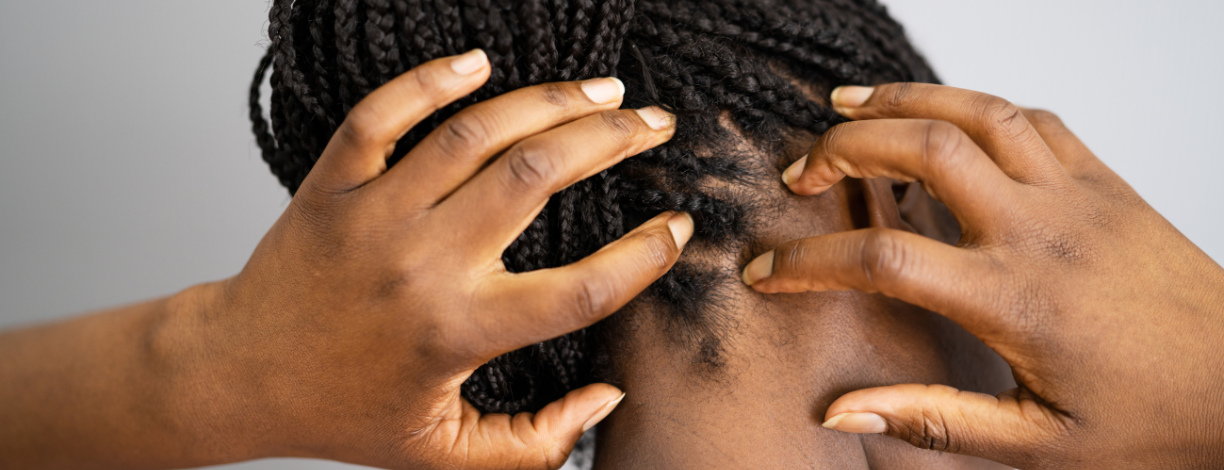Regardless of your age, skin sensitivity, or hair type, an itchy scalp can strike for a variety of reasons. Knowing how to identify the cause and treat the symptoms is essential for prevention and early intervention.
When encountering any new or severe skin condition use common sense and seek medical advice if symptoms persist or worsen. The guidelines below are intended only to assist you in the prevention and treatment of mild symptoms.
1: Allergic Reaction
While allergic reactions are surely the most common cause of scalp itch, with so many potential sources, it can be tricky to sort out the specific trigger. Any chemical treatment that comes into contact with the scalp is an obvious and easy-to-identify cause.
If you notice soreness or itchiness immediately following a color, bleach, or perm application, apply a topical soothing agent like Scalp Therapy and explore other options for your next treatment.
Pay attention to when in your wash cycle the itching peaks. If it’s closer to wash day, chances are it’s related to one of your leave-ins. If itching occurs randomly, it may be due to other allergens in your home or environment.
Regardless of the cause, Scalp Therapy can provide relief with natural anti-inflammatory agents, such as Blue Cypress and Calendula that calm irritation plus a soothing essential oil formula that quells scalp itch and soreness on contact.
2: Fungal Infection
Fungi love to hang out in damp, dark places! Under the right conditions, your scalp can become an ideal habitat for these organisms, including Candida (Yeast) and Ringworm (Tinea capitis – it’s not a worm), leading to anything from a mild itch to sores and temporary hair loss depending on the cause.
Avoid keeping damp hair in close contact with your scalp for extended periods of time (we’re talking to you, all of you night-washers and ponytail-wearers). Harsh shampoos, stress, pregnancy, chemotherapy, and dietary imbalances can all compromise the scalp’s acid mantle and open the door to fungal infections.
Left untreated, fungal infections can progress to cause dandruff or seborrheic dermatitis. Other than lifestyle changes, treatment can and should include a gentle sulfate-free shampoo, such as Get Clean (normal to dry hair) or Triple Threat (normal to oily hair), an acidifying pH-balanced conditioner, such as Featherweight or Intense Quench, and a moisturizing lotion such as Scalp Therapy, which contains a host of potent anti-fungal botanical agents such as Tamanu, Neem, and Andiroba.
3: Psoriasis & Eczema
These conditions are genetic, auto-immune conditions that are triggered by stress, allergies, and other environmental factors. Unlike mild fungal infections, symptoms are generally visible right away and may include red, rough patches, bumps, and peeling skin.
Early intervention and vigilance are essential in symptom management. While a complete cure is rare, it is always helpful to pamper your scalp with regular massages to stimulate blood flow and lymphatic elimination. This will also help to lower your stress level, further reducing another potential trigger.
With its cooling tingle, Scalp Therapy certainly makes the experience more of a pleasurable ritual, but you can always simply whip out your fingers and press, release, knead, and stroke your scalp. Always massage with the soft pads of your fingers and never with sharp nails, which can exacerbate inflammation.
4: Dryness
If your itching is worse on wash day and gets better through the week, chances are it’s a dryness thing. Even a mild shampoo and gentle dryer can be challenging for naturally dry skin and scalps.
To head off an itchy scalp, pre-treat with an oil such as Emollience Pre-Shampoo Treatment and apply Scalp Therapy directly to the scalp, massaging it after washing, but before detangling and styling.



